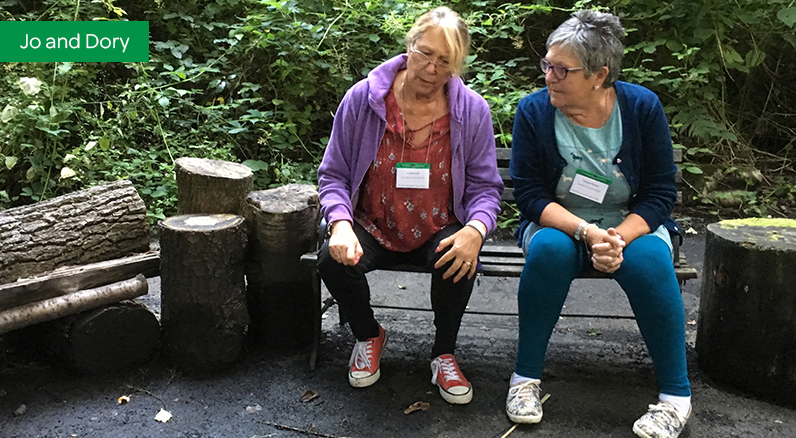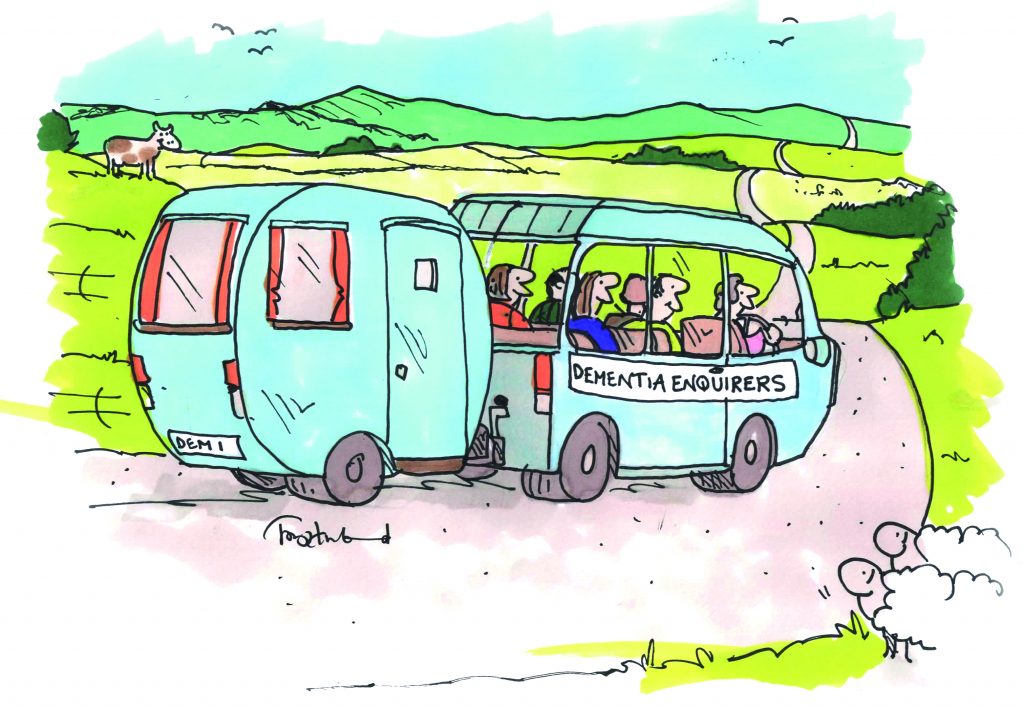
Recovery and Discovery
People with dementia as the experts
More and more people with dementia are sharing their personal tips, hacks, coping strategies through books, website, blogs and films. Philly Hare and a small panel of experts by experience (Wendy, Gerry, Chris and Allison) show a short film and guide us to various resources, including Tip-Share, Knowledge is Power, The Living with Dementia Toolkit and Wendy Mitchell’s book, What I Wish People Knew About Dementia.
You can watch it below:
The story of Craftivism
The wonderful Dementia Craftivists took off during the first lockdown and quickly turned into a very creative network – running online art and craft sessions for each other, and using their creations to send messages to the wider world. Do watch this film made by Philly Hare and Gail Gregory which looks at what the Craftivists have achieved, as well as featuring many of their wonderful creations. There is also a discussion with Gail and a number of her fellow Craftivists.
You can watch it below:
DISCOVERY study
We support people with dementia and carers to help shape a research project called DISCOVERY. This project is focusing on how NHS mental health Recovery Colleges can help to support people with dementia.
The project is led by Norfolk and Suffolk NHS Foundation Trust. Recovery Colleges offer educational courses, and include people with dementia as peer tutors. You can read more about the DISCOVERY project here: https://www.nsft.nhs.uk/discovery-study
Post Diagnostic Support
The more we listen to people with dementia the more we have discovered how inconsistent practical post diagnostic support can be across the UK.
After diagnosis, people with dementia still tell us about the feeling of being ‘left on a cliff edge’ following their diagnosis, with only a follow up appointment 6 months later, if at all.
They tell us too of the many unanswered questions that still remain about the implications of that diagnosis such as
- What does this mean? What exactly is dementia? What is happening in my brain? What will happen to me? Can I carry on doing things?
- Will I die? How long have I got left? Will I have to move home?
- What about my place in my own family and my family relationships?
A Good Life With Dementia
We realised that a post diagnostic course for people with dementia was needed, one designed, developed and delivered BY people with a dementia FOR people with a dementia.
Who better to learn from about living with dementia than people who are doing just that?
We initially worked with members of York Minds and Voices to create such a course – a platform for them to share with peers important messages about their own experience of living with dementia. Thus was born the first Good Life With Dementia course. You can watch a 5 minute video we made following that course below:
A Good Life With Dementia provides an ideal post diagnostic opportunity to learn amongst equals at a pace and in a space that is safe, comfortable, reassuring, welcoming, non-judgemental and fun.
The beauty of the Good Life approach is that it is not an ‘off the shelf’ programme. Rather it is a new course co-created each time by local people with dementia in their local area.
‘You should be able to receive your diagnosis and then be prescribed going on the Good Life course’
Howard – participant and (now) activist
To find out more about setting up and embedding A Good Life With Dementia in your area please contact Damian@myid.org.uk
Getting On with Life (GO!)
GO is another post diagnostic programme that we helped develop and pilot alongside Durham and Edinburgh university colleagues. It is a seven week programme which people living with dementia have helped to create and pilot. It enables people living with dementia to build the confidence and contacts they need to live the life they want to live in the best way possible. Like the Good Life programme it can be delivered either online (where it was piloted) or adapted for in-person delivery. Building relationships is at the foundation of the GO programme because that is how human beings function best – we all need each other.
‘You’ve got to get out there and live your life – you are still you’
Eddy – Living with dementia and Consultant on the GO Programme
View an animated overview below:
View an animation for potential participants below:
Again, for more information contact Damian@myid.org.uk
The full guide for facilitators and a weekly summary letter template can be found below.
Click here to download the full facilitators guide.
Click here to download for the summary letter template.
Recovery
By ‘recovery’ we don’t mean that people can recover from dementia – but that people can recover voice, control, identity and a place in their relationships and communities which sometimes get lost.
We believe that people with dementia should have the opportunity to discover new skills, new relationships and a new perspective on life.
‘My biggest complaint about living with dementia is other people’
(Richard. Retired headmaster, living with dementia)
Richard expanded on this, giving examples of exactly what ‘other people’ did. ‘Other people test me, correct me, point out my mistakes, talk over me, ignore me and sometimes blame me’. His peers around the table all agreed, mentioning anything other than the organic process going on in their brains as their biggest complaint about living with dementia.
The brain may be losing its potential over time but so many other factors prevent people reaching that potential. So we believe recovery IS possible – in terms of recovery of voice, choice, control, identity, citizenship and belonging amongst other things.
Our work has provided countless examples of a recovery.
‘Since coming to Minds and Voices my life has changed. I’ve never been so busy nor had such a social life’
Elaine, York Minds and Voices DEEP group.
Since we started in 2007 we have been inspired by people with dementia who have shown us time and time again that while a diagnosis of dementia might be life-changing, it need not be life-ending.
By inspiring challenging and different conversations about the lived experience of dementia. Innovations in Dementia are seeking to develop a newly emerging narrative about dementia across the UK. We adopt a philosophy of recovery and rights, within the social model of disability.
We aim for our conversations to be co-led by people with dementia themselves, who will be remunerated as consultants/trainers as any expert should.
This participatory approach will ensure people with dementia (the beneficiaries of services) are proactively engaged in the development and design of services, rather than passive recipients.
We can help you introduce a service designed developed and delivered by people themselves. Contact us if you wish to be at the centre of policy and practice innovation in your area.
Dementia Enquirers
Dementia Enquirers: The aim of the 3 ½ year project is to develop a new approach to research, or ‘enquiry’, that is led and controlled by people with dementia themselves.
The BIG Lottery Fund has awarded over £700,000. The project runs from October 2018 – March 2022.
Innovations in Dementia will support people with dementia to explore how knowledge is acquired and applied in a way that feels relevant to their own lives. They will be involved in identifying research priorities, and, helped by small grants, in planning and undertaking their own research.
Dementia Enquirers will support up to 20 DEEP groups to conduct their own small-scale research projects. Many groups have been involved in research studies carried out by universities. However, this project will give people with dementia a chance to lead, and be in control, of their own research – on issues that are important to them.
Training, guidance, support and ideas will be available to help groups to build their own research skills and expertise. University researchers may be involved as advisors or have roles in the projects. Small grants will be available for groups to get on with their own research projects. These groups will be encouraged to share their learning with the rest of the DEEP network.
The project will also explore with people with dementia the lessons that emerge from their work, and share this learning widely.
We are confident that the project can influence the prevailing approaches in research – while bringing new respect for the skills, expertise and resilience of those who are living with dementia.

